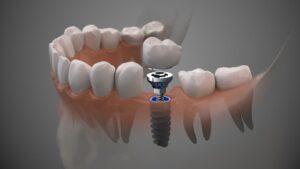
Many providers consider dental implants to be the ideal way to restore the appearance and functionality of your smile after tooth loss. They’re the only replacement teeth that are inserted into your jawbone, so they provide additional benefits over alternatives like dentures and dental bridges.
It’s important to note that not everyone is an immediate candidate for dental implants. Pre-existing oral issues can pose challenges and need to be addressed first. For instance, it’s quite common to require a bone graft to ensure your jawbone can adequately support the prosthetics. If you’re feeling uncertain about these additional treatments, keep reading to gain a better understanding.
Why Do I Need a Bone Graft?
It may be shocking to learn, but did you know that your jawbone starts to weaken after tooth loss? This is because every time you bite down, the roots of your teeth stimulate it to produce new bone growth so it remains strong and healthy. However, when you have a gap in your grin, there’s nothing there to keep your jawbone active. In time, it can become too thin to support any remaining pearly whites, let alone dental implants.
Your dentist will examine your mouth during your initial consultation to ensure that your jaw is sufficiently thick enough to support your artificial teeth. If it’s not, they may recommend a bone graft procedure.
What is a Bone Graft?
A bone graft is a surgical procedure that involves the transplantation of healthy bone tissue to rebuild your deteriorating jaw. This restores its thickness and density, making it more capable of supporting dental implants. Typically, the bone material used is from other parts of your own body, but in some cases, it may be sourced from a donor.
Does Everyone Need a Bone Graft?
Although it’s relatively common to require a bone graft prior to dental implants, not everyone needs it. That said, there are a few factors that can contribute to an increased rate of jawbone deterioration, such as:
- Your age. Older adults are more prone to bone resorption because the body uses the jaw as a source of calcium if it’s no longer needed for missing teeth.
- Your dental condition. If you have gum disease or a dental abscess, your jawbone is additionally impacted by the infection.
- Whether you smoke. Nicotine from cigarettes and vapes can restrict blood flow and oxygen levels, leaving your body unable to deliver essential nutrients to your mouth.
When Will I Be Able to Get Dental Implants?
Once this surgery is completed, it’ll be several months before your dentist can proceed with prosthetics. The new bone material must fuse with your jawbone, which can take anywhere from 3 to 9 months. During this time, you’ll visit your provider periodically to ensure you’re recovering without complications.
Your dentist will continue to monitor your oral condition so that once you’ve healed sufficiently, they can move forward with placing your dental implants!
About the Practice
Patients at Carlson Dental Group benefit from two highly skilled dentists who offer a full array of services under one roof, including dental implants. They have years of experience helping people build happy, healthy smiles regardless of their current dental status. By using state-of-the-art technology like digital imaging and impressions, they provide accurate, long-lasting restorations. Plus, they can complete the surgery in the office, so there’s no need to seek additional providers. If you’re suffering from tooth loss and want a consultation, you can request one on the website or by calling (904) 262-8449.
